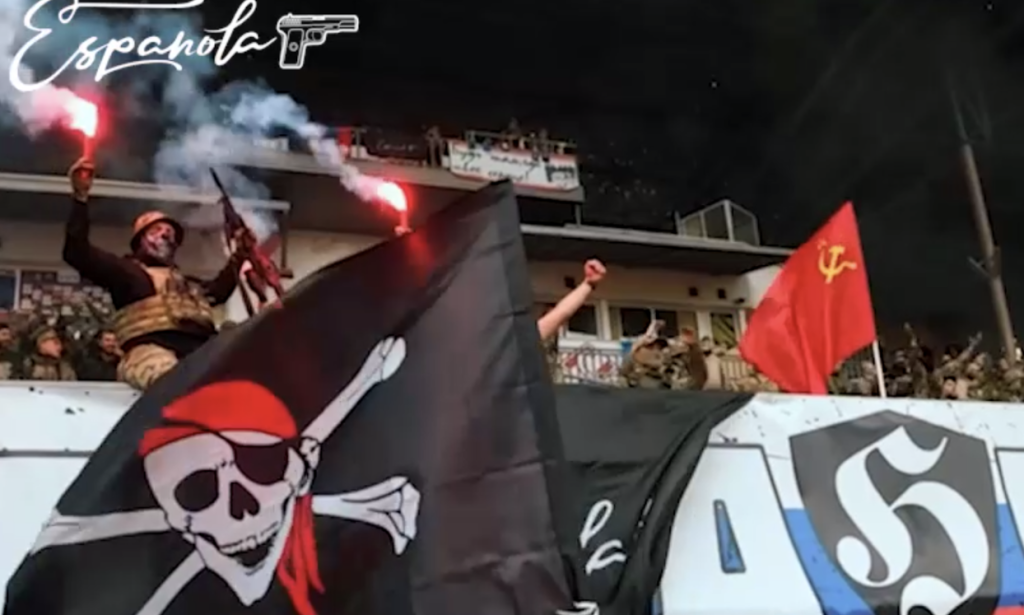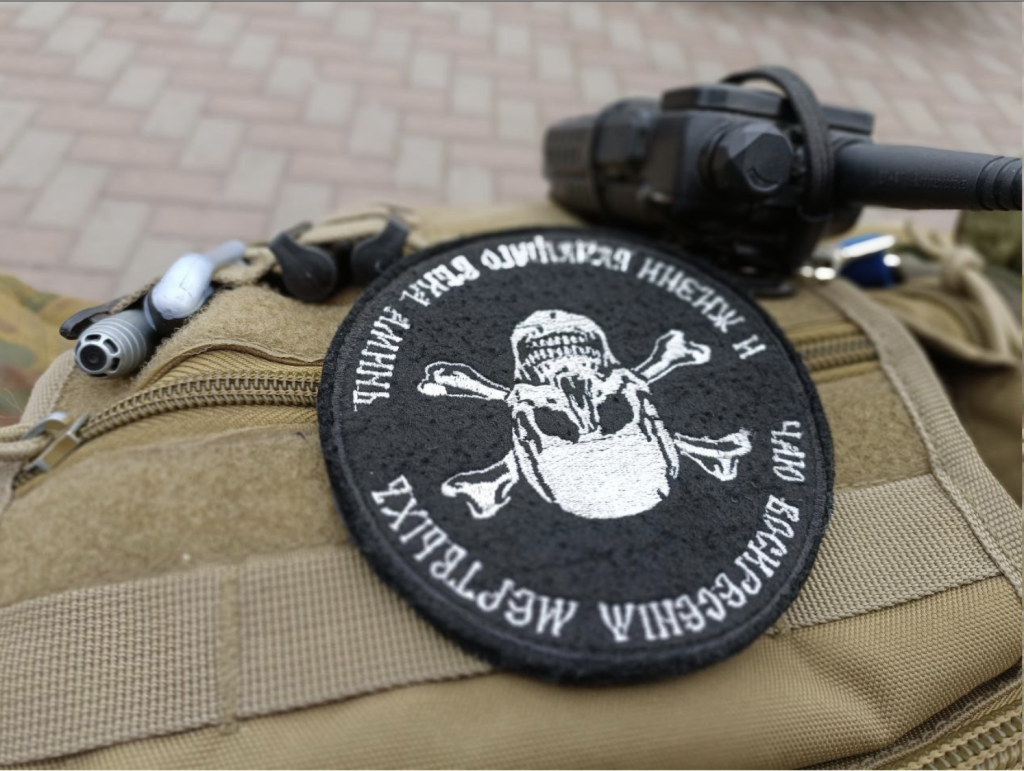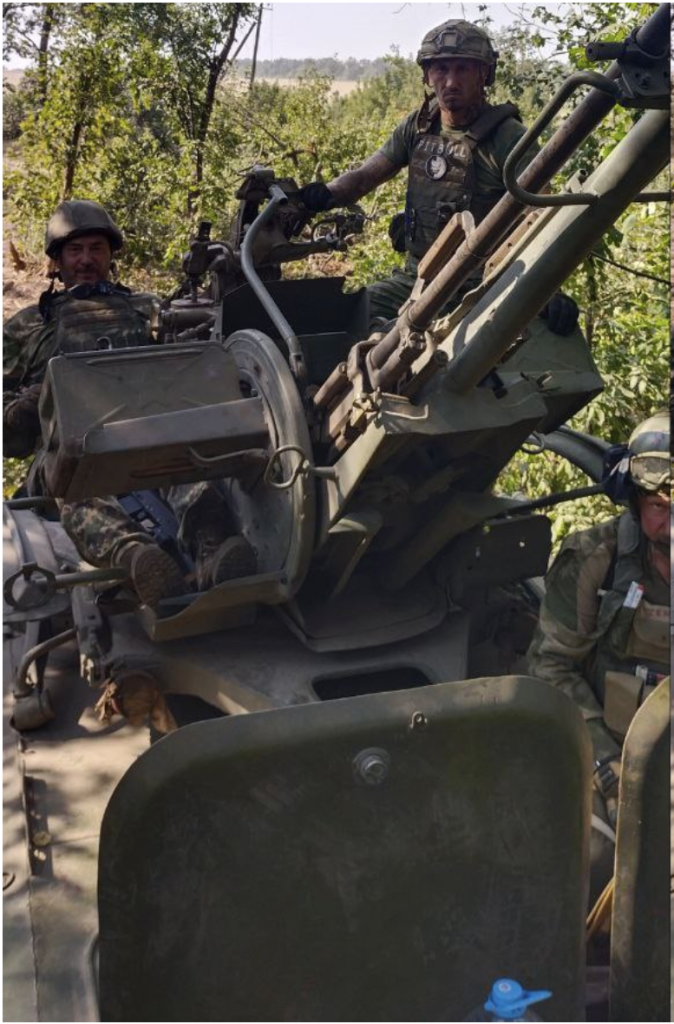Introduction
In a Mariupol football field, a video cut with Russian-language punk rock shows a group of men chasing a ball across the pitch. Around them, the flags of CSKA Moscow—a professional football club—flap in the late-winter wind, still cold enough that the spectators and some players are wearing toques. One of the teams, dressed in black uniforms with white lettering, claims the small plastic trophy. On the front, stylised lettering, including the shape of a pistol, reads “Española.” In a small tournament titled the “Cup of the President of Russia,” allegedly coinciding with the Russian presidential election, three teams competed, including one of sports veterans of the Donetsk People’s Republic, another from the 52nd Division of the 1st Air Defense/Missile Defense Army, and the men in black, soldiers from the Española Volunteer Brigade. Purportedly made up of former football hooligans, Española is a highly public portion of Russia’s fighting force and a wartime propaganda output. Española and similar militias fill some gaps left open in recruitment, allowing Russia to stave off the need for mobilising the numbers needed to sustain the widened invasion of Ukraine.
Española disseminates its propaganda and interacts with supporters using Telegram and the Russian social media platform VKontakte to recruit, raise money, and build support. The massive attention the outfit has attracted on the Internet in Russia and internationally has even landed key figures of the organisation on various Russian television channels, and the famous CSKA Moscow hockey team even had a night dedicated to the group, with members giving a pre-game address to the crowd and the players wore ‘Española’ patches on their jerseys. In this Insight, we will discuss and analyse Española’s founding, its appearances during Russia’s war in Ukraine, and the unit’s contributions to the Kremlin’s propaganda efforts.

Screencapture of a video released via Española’s Telegram showing a recent football game held in Mariupol.
Engagements, Combat Claims, Unit Strength, and Size
The extent of Española’s capabilities and activities on the frontline in Ukraine is hard to identify, given that existing information relies on its self-stated claims and scattered reporting. Based on Española’s social media posts (including obituaries to its killed personnel) and external reporting, Española’s personnel have likely undertaken operations in Soledar, Bakhmut, Kherson, Mauripol, Avdiivka, Vuheldar and more recently, Chasiv Yar, all located across Southern and Eastern Ukraine.
Their negative experiences of serving in these areas had likely motivated them to make numerous criticisms of how the Russian Defence Ministry had conducted the widened invasion campaign, with the formation’s Telegram account at one point going as far as to claim that although Wagner’s decision to engage in a mutiny was catastrophic, it’s harsh criticisms towards key figures in the Russian Defence Ministry such as Sergei Shoigu and Valery Gerasimov were valid.
According to media reporting, Española has claimed to have 550 personnel under its command, though this number has likely grown or decreased, depending on the success of recruitment and losses sustained by the unit. These personnel perform various roles ranging from assault infantry, sniper teams, artillery, and drone operators, as is common for most other volunteer units. Many of these personnel appear to be trained in Tambov, potentially at a training base of the GRU’s 16th Separate Guards Special Purpose Brigade.
Whilst many of Española’s personnel are former football hooligans, those with an ideological affinity to the unit with military experience have likely joined the unit, too. Española has even provided claims of foreign recruits in its ranks, such as a Spanish football hooligan from Aragon and Serbian personnel. Española also shed insights on its Analytics Centre ‘Melodiya’, which it claims to gather intelligence on areas its personnel are fighting in using OSINT, knowledge sharing with intelligence agencies and “pro-Russian human sources” inside of Ukraine, as well as identifying what resources its personnel are in need of and how to deliver them.
Recruitment and Politics
Española occupies a unique space in the Russian far-right military. Supportive but still separate from the Rusich group and Orthodox Russian Imperialist Movement, Española produces online propaganda through a collection of Telegram channels that represent the brigade and individual members. Española has successfully boosted its profile within the DPR and among Russian language supporters of the war. Besides the recent football tournament, the main Española channel promotes the group’s community initiatives and humanitarian work inside occupied regions of Ukraine. The connections to the football world have been the focus of the Russian press and the limited amount of international media coverage of the brigade, often focusing on how different warring hooligan firms have set aside sometimes violent rivalries to fight for Putin’s special military operation. Española’s propaganda targets a specific demographic of individuals for recruitment, namely hooligan ultras who do not typically express support to the Kremlin but are finding chances for fame, glory, and payment in the occupied territory. Supporters are alleged to come from across multiple different football clubs, including CSKA, Zenit, Spartak, Torpedo, Lokomotiv, and “dozens of others.”
Besides the self-adopted themes of football supporter culture, Española is making overtures to bring in female recruits. Exact numbers are unavailable, but women are severely underutilised on the Russian front, according to a report by Meduza investigating casualty rates on both sides. Cultural mores make women serving on the frontlines or in combat positions extremely unpopular among Russians, and only four female casualties were reported by the country’s forces in the summer of 2023. Nevertheless, Española started advertising and promoting its all-female sniper team during training via its official Telegram channel. Posts from the brigade claim that female soldiers work in attack aircraft formations, medicine, and communications, as well as electronic warfare, electronic warfare, and UAV units. Female soldiers have been awarded medals and unit-specific decorations for heroism, according to Española, due to their actions during the battle of Bakhmut.
In February 2023, Española called itself a Private Military Company in a Telegram post. Despite claims from its founder to be a completely independent brigade, its members are regularly decorated by the Russian Ministry of Defence. One presentation of the Order of Russia to the brigade’s members in late 2023 saw Lieutenant General Vladimir Stepanovich Alekseyev, Deputy Chief of Russia’s Military Intelligence Service (GRU), handing out the medals to unit members.
Origin
During the recent soccer tournament in Mariupol, the head of Professional Football Club CSKA and his deputy, a representative from Mariupol’s sports administration, and the founder and commander of the Española unit, Stanislav “Spaniard” Orlov, were pictured in attendance. Purported to be a former member of the CSKA Red Blue Warriors hooligan firm, the name Española is derived from Orlov’s callsign. Little is known about Orlov before his time fighting in Ukraine, other than he may have worked at a hotel and his hooligan affiliations. He has claimed to have completed some form of higher education and speaks several languages, including Spanish, which is the origin of his callsign. Some reports place him in the 106th Airborne Division during the Second Chechen War. He claims to have lost a family member after Ukrainian armed forces shelled Horlivka and allegedly began fighting to protect other relatives within Donetsk. After he arrived in Donetsk, he served as personal assistant to the commander of the DPR’s Horlivka militia. He established himself afterwards by founding “Skull and Bones” reconnaissance in 2014, a unit that included members of the Spartak Hooligan firm.

A patch from the Skull and Bone Reconnaissance unit posted to Española’s Telegram.
Española was formed by Orlov in 2022, allegedly after the battle of Mariupol. Made up of volunteers, the brigade initially began as a part of the Donetsk People’s Republic forces but now claims to operate independently from the Armed Forces of the Russian Federation and DPR’s forces. Recruiting, like many of the Russian militias operating in Ukraine, appears to be handled through the Redut-formation umbrella, though there are means to contact Española recruiters directly on Telegram. Redut is reportedly an initiative by Russian military intelligence to establish numerous volunteer units that help Russia’s force-generation efforts for the invasion of Ukraine.
Orlov’s Dogs
Since the days of Skull and Bones, Orlov has maintained a public-facing aspect of his organising, including participating in producing a short documentary on the reconnaissance company. Española has continued that tradition, elevating some of its members as social media war influencers. Nowhere is this better exemplified than in Mikhail “Pitbull” Turkanov, a commander of Española’s anti-aircraft battery, according to the brigade’s Telegram account. Turkanov is a 36-year-old former mixed martial arts fighter and former leader of a support crew for the St Petersburg-based Venit Football Club. Though never achieving significant success as a professional fighter, he did garner a small measure of notoriety after several publications focused on his swastika tattoos ahead of a bout in Sochi. Twice awarded the Russian Order of Courage, in both instances, “Pitbull,” as he is also known, is reported to have come to the aid of an injured soldier, including a commander in the area of Zaporizhzhia. Turkanov primarily uses a personal Telegram channel to communicate with his followers through video messages and pictures.

Image of Mikhail “Pitbull” Turkanov (top right) and two other members of Española posted to Turkanov’s official Telegram page.
Other notable members include Andrey Solomatin, a former football player and member of the Russian national team. He appeared initially in November 2022 Telegram posts from Española,
visiting the brigade and shortly after appearing in videos encouraging others to join the war effort. By August 2023, a Russian publication, Mash, reported that Solomatin had joined Española under the callsign “Soloma.” Pictures and video show him in combat fatigues
Concluding Recommendations
Understanding the subcultures of Russian volunteer units is essential for determining what messaging they use to recruit online and the sort of individuals to whom such recruitment drives appeal. For instance, in the case of Española, the far-right hooligan narratives and talking points are imperative to understand as they determine how the organisation operates internally, presents itself externally, and appeals to transnational political ecosystems of those with the same beliefs and values.
Those monitoring the activities of the group as it pertains to fundraising can also help identify how they fundraise, allowing authorities in the West to disrupt any contributions to such fundraisers coming from their own countries. If those in tech or policy domains can identify potential foreign recruits in these units, they can provide timely information to law enforcement, who can take action to confiscate their assets and take other legal actions against them.
Peter Smith is an investigative journalist, photographer and researcher focused on violent and extremist movements across the globe. He has written for the Canadian Anti-Hate Network, Militant Wire, the Jamestown Foundation, the Accelerationism Research Consortium, and more. Twitter/X: www.twitter.com/MisterEpet
Alec Bertina is a freelance open source researcher with a focus on Russian non traditional security actors and Russian internal security, non state actor use of unmanned aerial systems and Russian CT. He holds an MA in International Security from the University of East Anglia and has contributed to outlets such as Militant Wire, Taggespiegel, CBS News, Moscow Times and the Westpoint Combatting Terorrism Centre’s sentinel.
